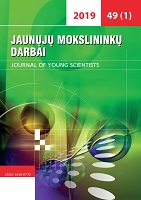VAIKŲ ELGESIO KULTŪROS UGDYMO(SI) BŪDAI IR METODAI RADVILIŠKIO „X“ IKIMOKYKLINĖJE UGDYMO ĮSTAIGOJE (ATVEJO ANALIZĖ)
TEACHING/LEARNING METHODS USED X PRESCHOOL INSTITUTION IN RADVILIŠKIS AIMED AT DEVELOPING CHILDREN’S SOCIAL BEHAVIOUR (CASE ANALYSIS)
Author(s): Jurgita Smilgienė, Dalė JonaitienėSubject(s): Preschool education, Developmental Psychology, Sociology of Education, Pedagogy
Published by: Vilniaus Universiteto Leidykla
Keywords: preschool institution; preschool age; teaching/learning social skills (behaviour); teaching/learning methods;
Summary/Abstract: Despite the child’s age adults play the most important role in building his social skills and teaching how to behave; here adults’ example has the biggest impact. Both, the family and a preschool institution, take responsibility for teaching the child social skills, educating him and motivating to be polite, dutiful, honest, friendly, etc. Educators use various methods and creative tasks to instill social skills and habits, they create situations in which children learn how to understand themselves, properly interact with others, be creative. Preschoolers are taught to communicate and cooperate, take responsibility for own and group work. In this context, a research question has been formulated as follows: What methods do educators use teaching children social behaviour? A survey was carried out in X preschool institution in Radviliškis. Respondents - 13 educators. A questionnaire was compiled to collect data on their experience in teaching social behaviour and on the use of teaching/learning methods. Content analysis was used to analyze qualitative data. The surveyed indicated that their primary task is to teach children social behaviour. Most often they use traditional teaching methods that suit preschoolers’ needs, e.g. role playing games, talks, demonstrations, less often - non-traditional ones. According to the respondents, disciplining, encouraging, explaining rules, taking children on trips and outings, reading and analyzing books for children brought success.
Journal: Jaunųjų mokslininkų darbai
- Issue Year: 2019
- Issue No: 1 (49)
- Page Range: 16-26
- Page Count: 11
- Language: Lithuanian

